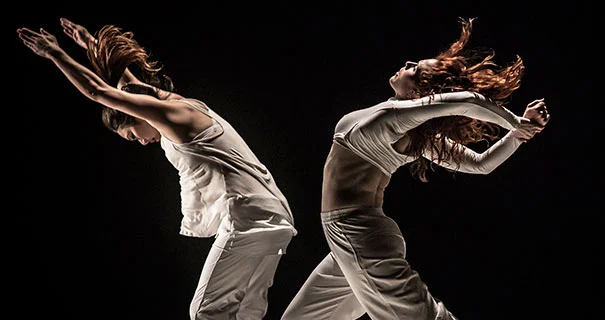Sarah Osterman Myers
Writer, Editor, Content Manager
Heidi Latsky Dance
Dance Review by Sarah Osterman Myers
Posted on Chicago Stage and Screen
One Hour: Two Works- performed by Heidi Latsky Dance
While dance can be about many things—movement, stillness, technique, athleticism— it is often about abilities: How long is the leg; how pointed is the toe; how flexible is the back; how high is the jump? How far can the body be pushed— physically and emotionally—while simultaneously telling a story, relaying an idea or evoking a feeling?
At the end of the day, dance is about the body, and New York-based Heidi Latsky Dance reminds dancegoers that bodies come in all shapes, sizes and with varied abilities. Some dance companies have fixed expectations or look for dancers with similar levels of technique and bodily makeup, but Latsky explores, accentuates and celebrates physical differences, allowing her ensemble of mixed-ability dancers to fill the stage with spirited individualism.
One Hour: Two Works at The Dance Center of Columbia College Chicago features nine vibrant performers who come from a variety of technical backgrounds but work harmoniously as a group. Latsky, a former Bill T. Jones dancer, has an explosive style— she plunges with bladed hands through the air, cartwheels her arms, and draws from a skewed ballet vocabulary that includes fifth positions, deep plies and petite allegro throughout.
The first piece, Solo Countersolo, is a riot of lively swimming, slicing, jumping, and prancing to a classical-sounding score by British composer Chris Brierley. The piece starts with one light streaming horizontally across the stage. As the dancers move from one standing formation to the next, their bodies eclipse the light, sometimes creating shadows or complete darkness. Latsky is quickly established as the featured mover, rolling her hips and shoulders and flinging hyperextended arms in juxtaposition to the slow-moving ensemble. Eventually, the group’s momentum builds as the music crescendos, and bodies start to fly across the stage. While Latsky’s style is very jumpy and vertical, she employs a relentless series of chaînés, tour en l'airs, and lunging forth positions to travel through space. The end result is a dynamic and hyperactive mass vs. Latsky, a mature soloist making sense of the commotion.
Somewhere starts with breathy bursts of strong and warrior-esque movement from the group. Then, stillness overcomes the stage as Rob Simpson, who has Parkinson’s disease, walks from one end of the stage and back. The first of many “Over the Rainbow” variations starts to play as he sits down in a chair, back toward audience, and performs a slow and meticulous port de bra—simple movement with a big impact. Throughout the piece, each dancer gets a chance, whether through solo or duet, to showcase his or her abilities. Most memorable is Alexander Whailes, a deaf actress/dancer, who grounds herself center stage and breaks into rhythmic gesticulations that seem fast and aggressive at first but soften into a beautiful sign language phrase at the end.
In an interview with The Dance Center, Latsky said: “I am fascinated by technical virtuosity, but I am just as compelled by someone taking a risk, showing his or her vulnerability, being in a raw state.” Each of her dancers experiences technique, risk, vulnerability and rawness during One Hour: Two Works, which makes for a memorable and inspiring show that transforms limitations into abilities.
Heidi Latsky Dance’s residency coincides with the American Dance Therapy Association (ADTA) and National Dance Education Organization (NDEO) joint conference November 5-9th in Chicago. The next two shows are November 7th and 8th at 8pm at The Dance Center of Columbia College Chicago, 1306 South Michigan Avenue. Single tickets are $30. For information, call 312-369-8330 or visit colum.edu/dancecenterpresents.
Tags: Heidi Latsky Dance, Chris Brierley, Carlos Arias, Christopher Ash, Lindsay Jones, Stewart Schulman, Leslie Smith, Brynt Beitman, Meredith Fages, Jerron Herman, Jillian Hollis, Saki Masuda, Robert Simpson, Alexandria Wailes, Gregory Youdan, The Dance Center of Columbia College Chicago, Sarah Osterman Myers


